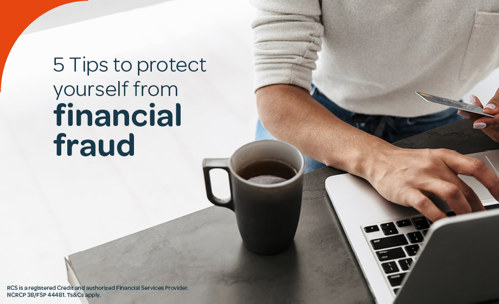5 Tips to protect yourself from financial fraud
11 AUGUST 2023
As we practice social distancing, you may be doing a lot of online shopping or managing your accounts and bills through online platforms. The financial climate of South Africa is one that is in constant fluctuation. Technology and the online space influence how we manage our finances in 2020, especially during the national lockdown as online platforms are used for shopping and managing bills. This opens us to more advanced types of fraudulent activity, so preventing and minimising the risk of financial fraud is important.
The financial climate of South Africa is one that is in constant fluctuation. Technology and the online space influence how we manage our finances in 2020, especially during the national lockdown as online platforms are used for shopping and managing bills. This opens us to more advanced types of fraudulent activity, so preventing and minimising the risk of financial fraud is important.
FINANCIAL FRAUD IN SOUTH AFRICA
The South African Banking Risk Information Centre (SABRIC) collated data surrounding the state of financial fraud in SA. All statistics in this article are derived from the 2018 crime stats.
In 2018, there was a significant 7% increase in the amount of bank-related violent attacks, despite the increase in online and remote banking. Cybercrime experienced a 75.3% spike inactivity, which highlights how digital fraud is a major area of concern in South Africa. However, credit and debit card losses due to fraud had decreased by 2.8%, showing that the precaution we take with our cards ultimately is of benefit.
DIGITAL FINANCIAL FRAUD
The two most common types of fraud are digital crime and card fraud. Digital crime is a type of financial fraud that is on the rise due to new ways of banking online. Social engineering gives criminals the opportunity to use phishing, vishing and email hacking to target unprotected information in the online space. Online banking, banking apps and mobile banking are three platforms that enable digital financial fraud. All three platforms experienced an increase between 35% to 100%.
Vishing is the most popular method of banking app fraud, where fraudsters pose as bank officials and phone their victims to manipulate them into disclosing their banking details. Online platforms are frequently used and are therefore the easiest way for fraud to occur.
HOW TO PROTECT YOURSELF FROM FINANCIAL FRAUD
Online banking requires extreme vigilance as fraud can occur in plain sight. Always use banking apps that are registered. Be wary of phishing and vishing attempts through email and phone calls where fraudsters claim to be a long-lost family member, a new love interest, a bank official, a fictional charity, or a false debt collector stating that a deceased family member has outstanding debt. Fraudsters are creative and will make use of any public personal information to target you.
QUICK TIPS TO PREVENT FINANCIAL FRAUD
- Do not disclose your PIN, password and banking details to anyone without verification when making transactions.
- Do not rush transactions online or in person. Be vigilant.
- Be wary of emails and phone calls requesting money.
- When something doesn’t seem right in your finances, question it.
- If you suspect you are being scammed, stop all contact with the scammer and report it to the police or your bank.
The 75.3% spike in digital banking fraud requires users to optimise the way banking is done online by staying ahead of criminal activity and advancements. Protect yourself through education and keeping up to date with the status of fraud in SA.
Enjoyed this financial wellness article? Read more here:
- Habits for financial wellbeing
- Make affordability work for you
- How to pay your loans faster and smarter



